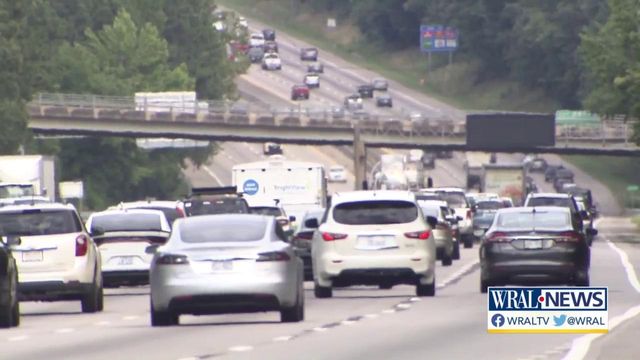Gov. Cooper outlines NC plan for more electric trucks, vans, buses
Governor Roy Cooper Tuesday offered details on his administration's plan to promote the electrification of tractor trailers, school buses, garbage trucks and other forms of commercial transportation in North Carolina.
Posted — UpdatedGovernor Roy Cooper Tuesday outlined his administration's plan for an "advanced clean trucks" rule that would promote the transition of medium- and heavy-duty vehicles to zero-emission electric vehicles. That would include tractor trailers, school buses, delivery vans and garbage and utility trucks owned by local and state governments and the private sector.
"These vehicles make up only 3.2% of vehicles on the highway. Yet 26% of the nitrogen oxide is emitted and 32% of the particulate matter come from them, because they're big diesel engines that spew out pollution," Cooper told reporters. "So this is a great area for us to concentrate [on], because there are fewer vehicles that we have to deal with, but you do more in reducing greenhouse gas emissions.
Speaking at an electric vehicle conference in Raleigh, Cooper said six other states are making similar moves, representing about 20 percent of the US population. But he emphasized that North Carolina won't be following in the footsteps of some seeking to get rid of diesel engines altogether.
"I don't see us getting into combustible diesel engines and requiring reduction there. What we are talking about only is increasing the number of zero-emission advanced clean trucks," Cooper said. "We want the result here to be more consumer choice on trucks in North Carolina, lower prices on those trucks."
Cooper, D-North Carolina, said his administration's rule, currently in the development process with stakeholders, would require medium- and heavy-duty vehicle manufacturers to offer more zero-emission choices on their North Carolina sales lots starting in 2026.
"There is no question that the vehicle and truck market around the world is transitioning to zero-emission technology as fast as it can," Cooper told attendees. "I have talked to CEOs across the world, and they are moving that way. Companies are in competition with each other to be first to market with these technologies."
The governor acknowledged that the transition will likely be a bumpy one. One major hurdle is the charging infrastructure needed to support more EVs on the roads. Cooper said federal funding available through the Bipartisan Infrastructure Bill will help the state fast-track that expansion.
Cost is another hurdle. While electric vehicles cost less to operate and maintain in the long run, they require a larger upfront investment. Cooper said he's hopeful economies of scale and technological innovation can help bring prices down.
North Carolina-based Thomas Built is the country's leading manufacturer of electric school buses. Vinfast and Toyota are already building electric vehicle and battery factories in the state, bringing in thousands of advanced manufacturing jobs. Cooper said that puts the state in an ideal position to become a leader in EV development and production.
"The economics of it are here. Do we want to take part in that economy and put more money in people's pockets or not?" Cooper said. "I think it's pretty clear that this is something that North Carolina needs to grab hold of and make sure that we are among the leading states, so we can reap the full financial benefits of this."
• Credits
Copyright 2024 by Capitol Broadcasting Company. All rights reserved. This material may not be published, broadcast, rewritten or redistributed.






